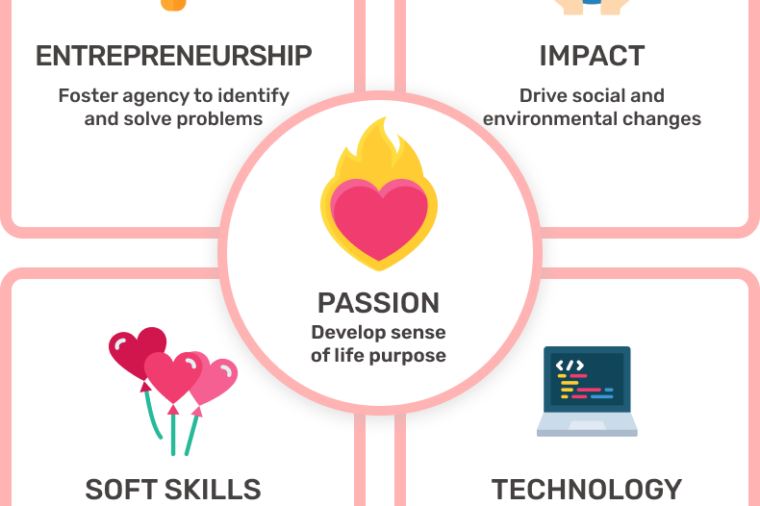Edstation attempts to tackle the limited opportunities high schoolers have to engage with and develop their passions, largely due to the prioritization of national standardized exams. Many of these students report life’s not worth living, feel ill-equipped to make career decisions, and express concern about entering professions where they fear underperforming due to a misalignment with their true interests. In addition, the lack of passion-oriented education compromises economic growth and decreases students’ aspirations to positively impact the world.
To address such issues, the proposed solution is an after-school program in which middle and high schoolers are encouraged to explore their passions by creating a startup addressing one Sustainable Development Goal (SDG) of their choice. Teams consist of students with diverse skills, categorized as hustlers, hipsters, and hackers. Teachers work in partnership with AI to deliver a full experience in terms of soft and hard skills development. At the end of the program, they present their ventures to a panel of investors.
At a glance
Designed for students from 7th to 12th grades, Edstation consists of a 40-hour curriculum and takes place in a classroom setting. Each class accommodates 12 to 20 students, with every student having access to an individual computer. The classes are conducted by a trained teacher from the school, ensuring personalized and interactive learning experiences.
Learning Model
Curriculum
At the heart of Edstation’s curriculum lies Passion, serving as the cornerstone that influences every other facet of the learning experience. By centering on the development of a sense of life purpose, the program ensures that students’ educational pursuits are deeply connected to their intrinsic interests and aspirations. This core principle radiates out to the other components of the curriculum. Entrepreneurship encourages students to channel their passion into agency, equipping them to identify and solve pressing problems with innovative solutions. Technology education is not just about staying abreast of rapid advancements; it’s about integrating these tools with a student’s passion to magnify their impact and adaptability. Soft skills training enhances students’ personal and professional lives, enriching their capacity to communicate, collaborate, and lead with empathy and effectiveness. Lastly, the Impact module aligns students’ passion with their ability to enact social and environmental change, ensuring that their educational journey has a positive and lasting effect on the world. Through this interconnected curriculum, Edstation fosters a holistic educational experience that places students’ passions at the center of their learning and growth.

Methodology
Edstation’s methodology is meticulously crafted to be learner-centric, placing the student’s interests, needs, and passions at the forefront of the educational experience. This approach is brought to life through group learning, where students collaborate in diverse teams, simulating real-world dynamics and promoting a deeper understanding through peer interactions. Human teachers play a pivotal role, concentrating on the nurturing of soft skills, such as empathy, communication, and teamwork, which are essential for personal and professional success. These skills are particularly emphasized as they can be sensitively tailored to each student’s developmental journey by the guiding hand of an educator. Complementing this, AI technology is utilized to impart hard skills, providing personalized and immediate feedback on technical aspects like coding, data analysis, and digital literacy. This dual-faceted approach ensures a balanced development of competencies, with AI delivering precision in skill acquisition and human teachers enriching the learning process with emotional intelligence and social skills, all within a framework that celebrates and elevates the learner’s passion.
Platform structure

Overarching structure of the platform. It outlines a progression of the units that seamlessly integrates the learning of hard skills, soft skills, and hands-on applications. In the chat there’s a dynamic interplay between AI and human instruction, adapting to the needs of each stage of the student’s journey.

The Hard Skills section showcases an instructional path where students engage with technical competencies across various units, benefitting from the precision and adaptability of artificial intelligence.

The Soft Skills section illustrates a sequence of units where human teachers guide the development of interpersonal abilities, emphasizing the cultivation of empathy, teamwork, and communication, for example.

The hands-on section is where students apply their acquired hard and soft skills in practical, real-world projects, culminating in an immersive learning experience that solidifies their understanding through action.



